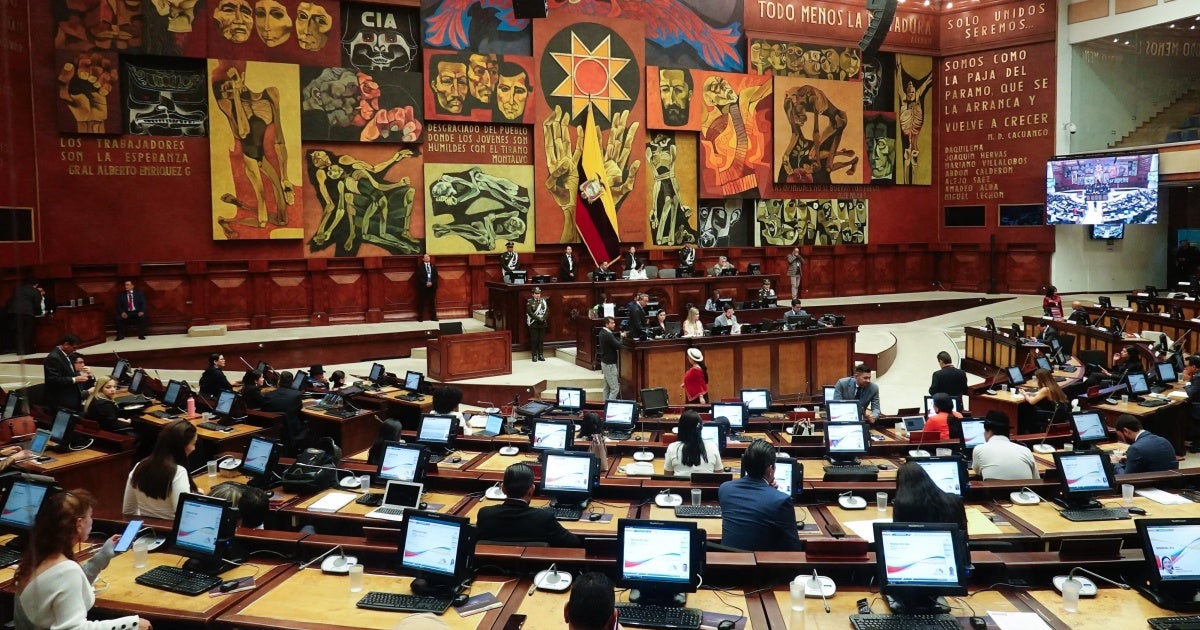
Ecuador Laws Threaten Human Rights
New laws passed by Ecuador’s National Assembly and signed by President Daniel Noboa include dangerous provisions that threaten the rights of Ecuadorians, Human Rights Watch said today.
On June 7, 2025, the newly appointed National Assembly approved through an expedited process the National Solidarity Law, which grants the president sweeping powers to declare and respond to an “internal armed conflict.” On June 10, the Assembly approved an Intelligence Law that creates a legal framework for intelligence and counterintelligence activities and operations. The legislation opens the door to the unjustifiable use of lethal force, threatens accountability for abuses by security forces, and undermines safeguards on intelligence gathering.
“While Ecuador urgently needs to address insecurity and organized crime, these new laws will do more harm than good,” said Juanita Goebertus, Americas director at Human Rights Watch. “Security won’t be built on rushed, poorly drafted, and overly broad legislation. It requires careful debate, strong safeguards, and respect for rights.”
In recent years, Ecuador has experienced a sharp rise in violence linked to organized crime, driving homicide rates to record levels in 2023, with more than 47 homicides per 100,000 people, according to the Ecuadorian Observatory for Organized Crime. In 2024, the Observatory reported a roughly 15 percent decrease in homicides. Yet homicides, in most cases committed by criminal groups, have increased again in 2025, according to government data.
The Assembly approved the National Solidarity Law based on a proposal sent by President Noboa in May. The law allows the president to declare an armed conflict, which allows security forces to use lethal force in situations in which international human rights law and Ecuadorian law would otherwise prohibit it. The apparent aim of the law is to give the authorities a freer hand in combating crime by dispensing with crucial human rights protections.
The Constitutional Court in several rulings has not accepted “internal armed conflict” as a justification for President Noboa’s declarations of a state of emergency, because the government’s arguments did not allow the court to verify the existence of the criteria established under international law for the existence of such armed conflict.
States of emergency under Ecuador’s Constitution have limitations on their duration and on the rights that can be suspended, and they are subject to oversight by the Constitutional Court. The new law creates a special legal regime that attempts to circumvent the constitutional framework for states of emergency, including Constitutional Court review.
The “armed conflict” framework established by the National Solidarity Law opens the door to serious human rights violations and will have consequences for Ecuadorians, Human Rights Watch said. The law allows security forces to conduct raids without warrants and to set aside restrictions on the use of lethal force that are essential to rights-respecting law enforcement.
The law defines “organized armed groups” who can be targeted as parties to an armed conflict vaguely to include groups made up of as few as three members who engage in “prolonged violence.” Law enforcement officials have the authority to determine which groups qualify as parties to the conflict.
The law allows the president to pardon members of the security forces who are under investigation for crimes committed during the supposed “armed conflict.” The law also prohibits the use of pretrial detention, house arrest, or electronic monitoring against members of security forces under investigation and establishes that they will continue performing their duties even while they are under investigation.
The Intelligence Law establishes a National Intelligence System composed of military, police, financial, tax, customs, penitentiary, and presidential security agencies, all coordinated by a governing body whose head is appointed by the president.
The Intelligence Law contains risky provisions that seem to depart from the constitution’s protections of the rights to personal data, which require the authorization of the owner or a legal mandate to collect the data; to personal and family privacy; and to the inviolability and secrecy of all types and forms of communication. Under the constitution, this information may not be accessed except in the cases provided for by law, after judicial authorization.
Under the new law, state entities, public and private institutions, companies, and individuals are required without exception to provide information to the National Intelligence System., with no court order required. This includes telephone operators, who will be required to hand over both previous and real-time data on people’s communications and connections without a court order. In addition, the National Intelligence System may intercept communications on vague grounds of “national security” without a court order.
These provisions undermine privacy and interfere with the right to private life and correspondence, Human Rights Watch said. The law could also create a chilling effect for free speech and put at risk professions protected by confidentiality-such as doctors, lawyers, and journalists-by potentially requiring them to disclose sensitive information.
These laws should be reviewed to ensure their alignment with the constitution and international human rights obligations.
“Ecuadorians should not have to choose between security and human rights,” Goebertus said. “Lasting security won’t come from granting unchecked power to security and intelligence agencies, but from strengthening the justice system, dismantling illicit economies, and protecting the rule of law.”
https://www.hrw.org/news/2025/06/19/ecuador-new-laws-endanger-rights


